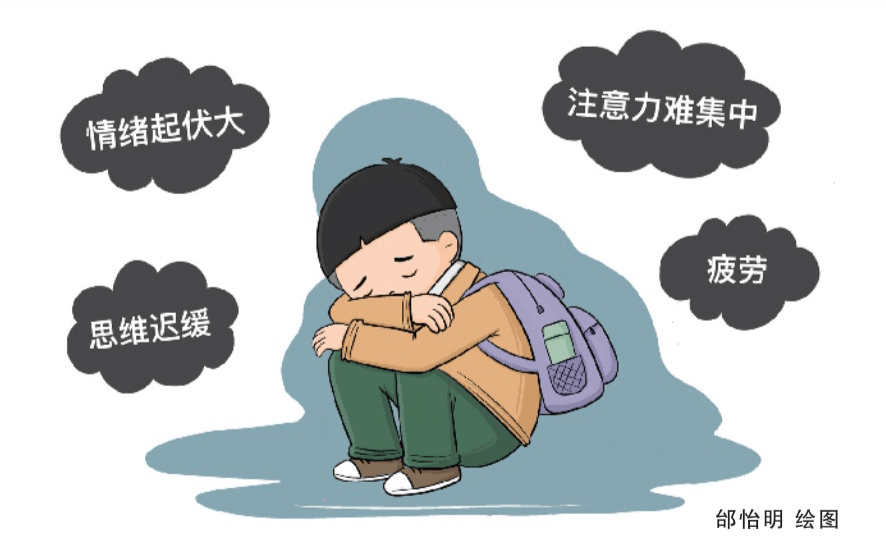In recent years, with the increasing attention to the topic of adolescents’ mental health in society, “depression” is no longer a distant unfamiliar term from life.
Actually, temporary bad emotions are very different from the severity and handling of pathological depression. When a child’s emotions fluctuate, how should parents deal with it? How to guide children reasonably?
Let’s take a look at the suggestions from Sun Xiaomei, the deputy secretary-general of the Psychological Crisis Intervention Committee of the Chinese Psychological Society!
01. Depressed mood is different from depression
A large number of research results show that improper handling of mental health issues before adolescence can easily hinder the development of adolescents in terms of brain development, learning ability and motivation, social interaction, self-esteem, among other aspects, which will lead to hindered physical and mental development in adulthood.
Depressed mood and depression are very different. Most people may experience the former in their lifetime, which is a temporary state, while depression is a mental illness diagnosis that needs judgment based on different severity levels within a major depressive framework.
02. Common symptoms of depression
Common symptoms of depression in children and adolescents include feeling or appearing depressed, sad, tearful, or irritable, with significant emotional fluctuations; reduced interest in things compared to before; decreased time spent with friends or in extracurricular activities; changes in appetite or weight; more or less sleep than usual; looking tired or feeling fatigued, or decreased energy; feeling everything is their fault or they are not good at anything; difficulty concentrating; less caring about school or a decline in academic performance; slowed thinking; having suicidal thoughts or attempts; paying attention to literary works, movies, video games, idols, joining communities, etc., related to themes of content and the meaninglessness of life.
Children may also show disobedience and have more physical discomfort, such as frequent headaches or stomach aches; adolescents may have frequent conflicts, arguments, or avoidance of communication with teachers, and depressed adolescents may use alcohol, other drugs, or excessively engage in electronic devices, masturbation, or sexual behavior to try to feel better, and some may even exhibit paranoid delusions, hallucinations, etc.
03. Causes of depressed mood and depression
Depressed mood generally has specific triggering events, such as failing a mock exam before the college entrance examination, unrequited love, etc., with an impact lasting generally within two weeks, gradually diminishing or disappearing with time, usually not significantly affecting daily life.
Depression has no clear external triggers, or under the influence of external triggers, if the duration is too long or the reaction is too intense, lasting for two weeks or more, and having a significant impact on life, academics, social interactions, family life, causing feelings of inferiority, disinterest in everything, suicidal thoughts or attempts, and not achieving noticeable results after self-regulation.
An individual’s experience and condition are quite different when they have depression, such as feeling that many situations in life are hopeless, having particularly negative emotions, feeling like there is no way out, no solution, including being unable to resolve past emotional issues.
Instances of suicide due to depression are unlikely to be caused by a single sudden event; rather, they usually result from experiencing many things early on in life, although individuals may have coping strategies, lacking professional help prevents them from effectively overcoming depression and realizing that they have different choices.
04. What should parents do?
If a child is truly experiencing depression, parents must provide understanding and join hands with professionals to offer genuine help to help the child overcome it.
If common signs of depression are observed in a child, seek medical attention promptly at a psychiatric specialist hospital or other psychiatric healthcare institution; ideally, choose a psychiatrist specializing in children and adolescents if possible. After receiving professional diagnosis and treatment advice, continue with regular follow-ups and cooperate with psychological therapy.
Check out! The Handbook for Promoting Mental Health in Elementary and Middle School Students (Teacher’s Edition) is here!
Bian Yufang: How can parents understand children and protect their mental health?
Kang Liying: How can homes, schools, and communities complement each other’s strengths and unleash collaborative education power?
What are common psychological issues among adolescents? How should they be addressed? This article has the answers.
The “New Rui Cloud Classroom for Family Education” in Beijing focuses on hot topics in family education since 2020, inviting experts from the fields of child psychology, education, sociology, etc., to conduct interactive live broadcasts on the Beijing Family Education Guidance Service online platform, providing scientific guidance and services to families.
Scan the code to watch
By | Journalists Ren Jie, Zhang Jing, Yang Linlin from “Labor Afternoon News”
Shared from | “Labor Afternoon News” Family Education Park section “How can parents judge whether a child is emotionally unwell or has psychological issues?”


